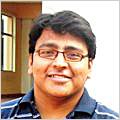TOP
 Events & Outreach
Events & Outreach
 R-CCS Cafe
R-CCS Cafe
 The 194th R-CCS Cafe - part 1
The 194th R-CCS Cafe - part 1
The 194th R-CCS Cafe - part 1
Title
Role of Spin-Orbit Coupling in the Magnetic Anisotropy of Metal Complexes
| Date | Fri, Jul 10, 2020 |
|---|---|
| Time | 4 pm - 4:20 pm (5:05 pm - 5:20 pm Free discussion with speakers, 5:20 pm - Free discussion) |
| City | Kobe, Japan |
| Place | Online seminar on BlueJeans
|
| Language | Presentation Language: English Presentation Material: English |
| Speakers |
Sabyasachi Roy Chowdhury Computational Molecular Science Research Team  |
Abstract
In the search for single molecule magnets, metal ions are considered pivotal towards achieving large magnetic anisotropy barriers. Linear or near‐linear bi-coordinate mononuclear Co(II) complexes are studied as potential single‐molecule magnets owing to the strong spin-orbit coupling constant of Co(II) and its low coordination number, which results in the retention of the unquenched metal‐orbital angular momentum [1]. The spin-orbit coupled unquenched orbital angular momentum of the metal centre produces strong magnetic anisotropy through ligand‐field interactions. In this context, the influence of ligands with heavy elements, showing large spin–orbit coupling, on magnetic anisotropy barriers was investigated using a series of Mn(II)-based complexes, in which the metal ion did not have any orbital contribution. The mixing of metal and ligand orbitals was achieved by explicitly correlating the metal and ligand valence electrons with CASSCF calculations. The CASSCF wave functions were further used for evaluating spin–orbit coupling and zero-field splitting parameters for these complexes. For Mn(II) complexes with heavy ligand atoms, such as Br and I, several interesting inter-state mixings occur via the spin–orbit operator, which results in large magnetic anisotropy in these Mn(II) complexes [2].
[1] S. Roy Chowdhury and S. Mishra Eur. J. Inorg. Chem. (2017) 659-668.
[2] S. Roy Chowdhury and S. Mishra Phys. Chem. Chem. Phys. 19 (2017) 16914-16922.
Important Notes
- When the speaker is talking, please mute your microphone.
- The broadcasting can be interrupted or terminated depending on the network condition or any other unexpected event.
- The program schedule and contents can be modified without prior notice.
- Depending on the utilized device and network environment, it may not be able to watch the session.
- All rights concerning the broadcasted material will belong to the organizer and the presenters, and it is prohibited to copy, modify, or redistribute the total or a part of the broadcasted material without the previous permission of RIKEN.
(Jul 3, 2020)
